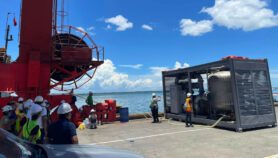By: Valeria Román
Send to a friend
The details you provide on this page will not be used to send unsolicited email, and will not be sold to a 3rd party. See privacy policy.
Argentina has started to construct two Earth observation satellites in an attempt to improve the management of emergencies, such as forest fires, and to provide an early warning system against environmental threats, such as drought or flooding.
“This mission is a big challenge for us, because Argentina has never built satellites with a synthetic aperture radar [which uses microwaves to monitor ecosystems night and day],” says Fernando Hisas, project manager of the National Commission of Space Activities, Argentina’s space agency.
Given the country’s economic crisis, Hisas says that the two satellites are vital for Argentina’s future development. “They will provide scientists with important information that can help raise productivity in fields such as agriculture, mining, fossil fuels and fishing,” he says.
The satellites — called Saocom 1 and 2 — will monitor the state of glaciers, snowfall, and coastal areas, as well as volcanic eruptions. They will also help to provide advance warning of potential catastrophes, such as drought.
“The information that these satellites provide will help regional and provincial governments, as well as national organisations, to take better decisions in important areas of economic activity,” says Alberto Giraldez, senior researcher on the project.
Argentina’s space agency is financing the satellites using a government allocation that last year was equivalent to US$118 million. But following devaluation of the Argentinean currency this is worth only US$32 million today.
Given this reduction in funds, researchers have begun to produce some parts of the satellites themselves, such as the solar panels, which had previously been imported from Italy.
“In future, Argentina will be able to share more critical information with other countries in the region, and will also be able to export satellite components or other related technologies,” says Hisas.
Argentina is collaborating with a number of European countries on the Saocom mission. Belgium is developing software to control the Argentinean satellites’ radars from the Earth, the Italian Space Agency will operate four satellites, and France is in negotiations over providing a further three.
All the countries involved will have shared access to information generated by the satellites, which will start to be launched from 2004.
© SciDev.Net 2002













